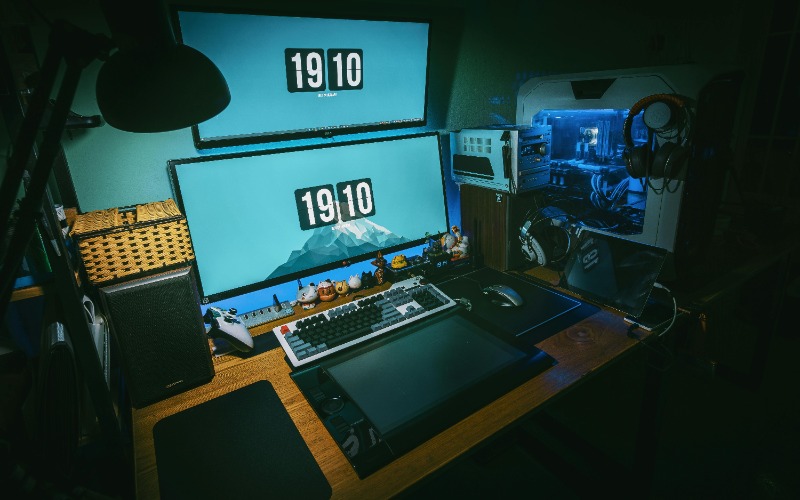The gaming industry is experiencing rapid transformations driven by groundbreaking technologies that enhance game development and player experiences. This year has seen significant technological advancements that promise to redefine gaming norms and expectations. In this article, we delve into the most influential tech trends of 2024 that are shaping the future of gaming.
Augmented Reality (AR) Expansion
Augmented Reality (AR) technology has leaped forward in 2024, providing gamers with immersive experiences that blend the real world with virtual elements. AR has evolved beyond simple overlays, integrating contextual data about players’ environments, resulting in more engaging and interactive gameplay. The introduction of AR in mobile gaming has expanded its accessibility, allowing users to experience augmented realities right from their smartphones, thereby increasing engagement levels significantly.
Developers are now using AR to create more personalized gaming experiences. By leveraging environmental and spatial data, games can adapt to the physical surroundings of the player, making each session unique. This technology not only boosts the entertainment value but also enhances the educational aspect of gaming, making complex concepts more accessible through interactive learning environments.
The Rise of Cloud Gaming
Cloud gaming continues revolutionizing the industry by enabling gamers to stream games directly to their devices without needing high-end hardware. The growth of cloud services has democratized access to the latest games, eliminating the need for expensive consoles or PCs. Players can now enjoy high-quality gaming experiences on their existing devices, including smartphones, tablets, and laptops.
This technology has also allowed developers to update games in real time and deliver these updates directly to players without requiring lengthy downloads or patches. It represents a shift towards more sustainable gaming, reducing the need for frequent hardware upgrades and minimizing electronic waste.
AI-Driven Game Development
Artificial Intelligence (AI) has transformed how games are designed and played. AI algorithms create more realistic game environments and smart, adaptive gameplay. AI enhances the realism of non-player characters (NPCs) by giving them the ability to learn from players’ actions and react in increasingly sophisticated ways.
Furthermore, AI is instrumental in procedural content generation, where game environments and scenarios are dynamically created as the game progresses. This makes games more engaging and significantly extends their replay value by ensuring that no two gaming sessions are exactly alike.
Virtual Reality (VR): More Than Just Games
Virtual Reality (VR) has surpassed its initial gaming focus, venturing into new domains such as virtual meetings, simulations, and training environments. However, in the gaming sector, VR continues to push the boundaries of immersion. With improvements in headset design, reducing weight, and increasing comfort, combined with higher resolution displays and faster processing, VR games are becoming more accessible and enjoyable.
Companies are investing in making VR more social, with multiplayer experiences that connect people across different locations. These advancements are enhancing user engagement and paving the way for VR to become a common tool for social interactions and professional collaborations.
Enhancing Connectivity with 5G Technology
The rollout of 5G technology has been a game-changer for the gaming industry in 2024. Its impact is evident in the enhanced connectivity and reduced latency it offers, providing a smoother and more responsive gaming experience. This advancement is crucial for multiplayer games, where timing and quick responses are essential for gameplay and competition.
With 5G, players can enjoy faster download speeds, which means quicker access to games and updates. Additionally, this technology supports a larger number of connected devices at once, allowing more people to join online games without degrading the performance. The low latency and increased bandwidth ensure that players from different geographical locations can compete against each other with minimal lag, making online tournaments and esports more accessible and fair.
Blockchain and Cryptocurrency in Gaming
Blockchain technology and cryptocurrencies are increasingly integral to the gaming industry, offering a new layer of security and transparency for transactions. In 2024, these technologies will be used for managing in-game purchases and assets and for providing players with actual ownership of their digital items through non-fungible tokens (NFTs).
Players can trade and sell digital assets like skins, characters, and even in-game real estate, potentially earning real-world profits. This has opened up new revenue streams for developers and a new economy within the gaming world itself. Additionally, blockchain ensures that transactions are secure and immutable, preventing fraud and unauthorized duplication of rare items.
The Integration of Wearable Tech
Wearable technology has started to play a significant role in the gaming industry by enhancing the immersive experience and providing new ways to interact with games. In 2024, devices such as smart gloves, VR headsets, and haptic suits are common, allowing players to feel and interact with virtual environments in a more tangible way.
These devices improve the realism of games and have potential health benefits by encouraging physical movement and interaction. For example, games designed for VR and wearable tech can require players to perform physical actions, which helps in promoting an active lifestyle. Moreover, wearable tech can track a player’s vital signs and adapt the game difficulty based on their physical responses, providing a personalized gaming experience that is both challenging and accessible.
Sustainable Gaming Practices
As the gaming industry continues to grow, so does its environmental impact. However, in 2024, there is a strong movement towards sustainable gaming practices. Developers and manufacturers are increasingly conscious of their roles in promoting sustainability, focusing on reducing energy consumption and utilizing eco-friendly materials.
Digital downloads have become the norm, significantly reducing the production of physical game copies and packaging. Additionally, gaming consoles and PCs are now designed to be more energy-efficient, which not only lowers the carbon footprint but also reduces the cost for consumers. Companies are also implementing programs to recycle old gaming hardware and refurbish used devices, extending their life cycles and reducing waste.
Advancements in Game Streaming Services
Game streaming services have taken center stage in 2024, transforming the way players access and engage with video games. These platforms eliminate the need for high-powered gaming hardware, allowing players to stream games directly from the cloud to various devices, including TVs, tablets, and smartphones. This accessibility has opened up gaming to a broader audience, making it easier than ever for individuals to dive into gaming without significant upfront investments.
The improvement in streaming technology has also allowed developers to broadcast their games at higher resolutions and with minimal delay. As a result, gamers can enjoy detailed and vibrant graphics without experiencing the lag that once plagued earlier streaming services. This has significantly enhanced the competitive gaming landscape, where even milliseconds can make a difference in player performance.
Gamification Beyond Entertainment
In 2024, gamification—the application of game-design elements in non-game contexts—has expanded beyond traditional entertainment realms into education, fitness, and professional training. By incorporating game mechanics into learning and training modules, organizations are witnessing improved engagement and retention among participants.
Educational institutions are using gamification to make learning more interactive and enjoyable. By rewarding students with points, badges, or levels for completing tasks or achieving goals, educators can motivate students and encourage a more active involvement in the learning process. In the corporate sector, gamification is used for employee training programs to engage workers better and enhance their skills more effectively.
The Impact of AI on Personalized Gaming Experiences
Artificial Intelligence (AI) will continue to be a driving force behind personalized gaming experiences in 2024. AI algorithms analyze player behavior to tailor game scenarios and challenges based on individual preferences and skill levels. This personalization enhances player engagement and extends the lifecycle of games by providing a continually adapting and challenging environment.
AI is also used to develop adaptive soundtracks in games, where the music and sound effects change based on the player’s actions and the in-game environment. This dynamic audio enhances the immersive experience of games, making them more engaging and emotionally compelling for the player.
Esports: The Professionalization of Gaming
Esports has seen tremendous growth in 2024, with more formal structures and larger audiences than ever before. Major gaming titles are at the forefront of this movement, with tournaments attracting global audiences and offering substantial prize pools. This professionalization has increased the legitimacy of esports as a career and spurred significant economic activity in related industries, including advertising, broadcasting, and merchandise.
Esports athletes are now recognized as professionals, undergoing rigorous training routines, and participating in competitions as demanding as those in traditional sports. The sector’s expansion is supported by the development of dedicated esports arenas and the establishment of more college scholarships and courses aimed at careers in gaming and esports management.
Revolutionizing Online Gambling with Advanced Tech
The integration of advanced technologies is profoundly reshaping the online gambling sector. Websites like Gambler Casino are at the forefront, helping users find the most innovative and handy online casinos to suit their needs. These online casino platforms utilize AI, VR, and blockchain technology to offer a more immersive and secure gambling experience than ever before.
Artificial Intelligence (AI) in online casinos has revolutionized customer service and security. AI-driven chatbots provide round-the-clock customer support, offering instant responses and assistance to players. Additionally, AI is used to enhance security measures by detecting and preventing fraudulent activities, ensuring a safe and trustworthy environment for users.
Enhancing Accessibility and Mobile Gaming
As mobile devices continue to evolve, so does their influence on the gaming industry. Mobile gaming has become a dominant mode of play, and online casinos have adapted by optimizing their platforms for mobile use. This means better graphics, smoother gameplay, and more accessibility for players on the go.
The development of mobile-friendly online slots and table games ensures that players have access to their favorite games anytime and anywhere. This accessibility has significantly expanded the reach of online casinos, attracting a broader audience and contributing to the growth of the online gambling industry.
The Future of Game Design and Development
As we move deeper into 2024, the future of game design and development is being shaped by the rapid advancement of technology and the shifting preferences of players. This evolution is prompting developers to rethink traditional gaming paradigms and explore new ways to create engaging and meaningful experiences.
Emphasis on Diverse Storytelling
Game developers are placing a stronger emphasis on diversity in storytelling, aiming to reflect a broader spectrum of experiences and perspectives. This shift is not only about including diverse characters but also about crafting stories that resonate with a global audience. By integrating culturally rich narratives and complex characters, games are becoming more inclusive and reflective of the world’s diversity.
This approach not only enhances the depth and appeal of games but also fosters a more connected and empathetic player community. As stories become more varied, players from different backgrounds see their experiences and histories represented, which enhances engagement and investment in the gameplay.
Utilization of Advanced Development Tools
The utilization of advanced development tools is enabling creators to build more complex and visually stunning games. With engines like Unreal Engine 5 and Unity offering unprecedented graphics and physics capabilities, developers can create detailed and immersive worlds that were once impossible to achieve.
These tools also streamline the development process, allowing teams to focus more on creativity and innovation rather than technical limitations. Smaller indie developers benefit significantly, as these tools level the playing field, enabling them to produce content that rivals that of larger studios.
Cross-Platform Play Continues to Grow
Cross-platform play has become a standard expectation among gamers, urging developers to create games that can be played across various systems and devices. This interoperability not only improves accessibility but also enhances the social aspect of gaming, allowing friends to connect regardless of the hardware they own.
Game companies are increasingly adopting strategies that favor cross-platform capabilities, recognizing that the ability to play together, regardless of platform, significantly boosts game popularity and longevity. This trend is likely to continue growing as new technologies make it easier and more efficient to develop games that offer seamless cross-platform experiences.











